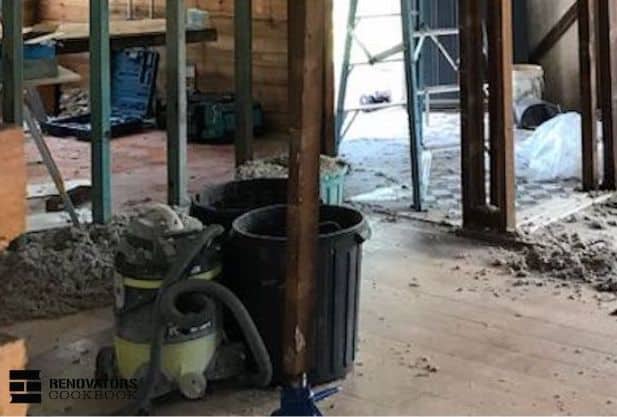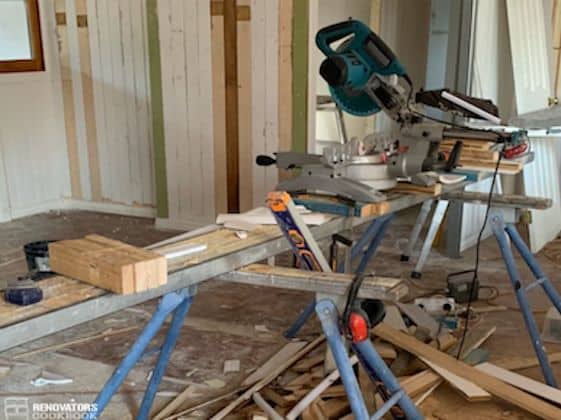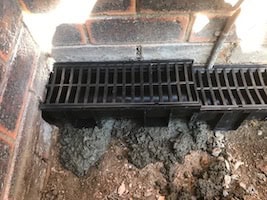Having a reliable heavy-duty vacuum cleaner on hand is more than just convenient – it’s indispensable. And as a builder and DIY enthusiast, ending each day with a clean worksite isn’t just a habit – it’s a vital practice.
Kick-starting the morning with an organized and safe environment means you’re setting the stage for maximum efficiency and safety throughout the day.

In this post we’ll delve into the key considerations for choosing the perfect heavy duty vacuum cleaner for your job site. And I’ll share my top recommendation to help you maintain a safe workspace. A clean and tidy site that enhances productivity so you can focus on your project without tripping over debris and off-cuts or inhaling harmful dust particles.
We recommend products based on our experience and benefit to our DIY community. If you use our links to make a purchase, we may earn a commission which is no additional cost to you. Read our disclosure policy here
1. What are the materials to be cleaned by the vacuum cleaner?
Before exploring features like capacity and filter types, make sure you understand exactly what you need your vacuum to do.
- Will there be a need to remove dust and powders (eg dust from cutting tiles or bricks, drywall)?
- If there’s dust, are any of the materials hazardous?
- What about liquid spills? If so, what types of liquids will need cleaning up?
- What about timber cut-offs, plaster remains, concrete pieces, etc.?
These answers will make it easier to choose the brand and model best suited to the job.
Wet/Dry Bags
There are 2 different types of bags. Dry and Wet is, of course, if you’re need to suck up water in wet areas (eg if you’re using a wet saw). It’s worth making sure the vacuum clean can do both.
2. What size or strength am I going to need?
This depends on how big the job is and the materials you’ll be cleaning up. Vacuums are not a one-size-fits-all type of solution. Heavy-duty vacuum cleaners can contain a range of material, typically from from 10 to 20 gallons.
- If you choose a vacuum that’s too small, you’ll spend more time than you’d like continuously emptying the waste.
3. What about hose attachments, or accessories?
While the vacuum is the core solution, it’s not the entire one. The right hoses and accessories are essential to get to those hard-to-reach places for a thorough clean. You don’t want the dust from cutting materials hanging in the air.
Power tools like power saws, angle grinders and concrete grinders often come attachments that hook directly to your vaccum cleaner. This means when you switch on the tools, it also switches the vacuum cleaner on. They work in sync. With the vacuum connected close to the blade, the dust is captured immediately as you grind or saw.
Often these attachments are included with your purchase of the grinding or cutting tools, making the clean-up job easier. For example, I recently bought a Makita power saw and a diamond blade saw. And both of these tools came with vacuum attachments.
4. Are heavy duty vacuum cleaners hard to manoeuvre?
Safety is paramount with all DIY jobs – and this task is no exception. Surprisingly you’ll find that heavy-duty vacuums are much safer than smaller every-day models, as they’re continually used.
Tip: Choose one that rolls smoothly and has lockable casters.
Some of the factors that make them more comfortable and safer to use:
- Expect them to be balance designed and quite sturdily built
- Larger machinery tends to be strictly regulated to satisfy compliance requirements, and to abide by safety standards as stipulated by governmental bodies.
- They’re designed to be user-friendly. Heavy-duty vacuums have a comfortable system to release the collected waste, either by a detachable container, or bag.
- Typically (but not always) they are quieter for safety reasons –both for the operator and anyone else nearby.
5. What about disposing of all the waste that's been collected?
I prefer to use bags because when it comes to emptying, the waste is sealed and there’s no harmful dust floating in the air.
6. Our recommendation - Vacmaster Professional Beast
If you decide to purchase a heavy-duty vacuum cleaner I highly recommend the Vacmaster Beast Professional Series. I like these because at around $190 (at time of writing) it offers exceptional suction, and can be used with or without bags. It’s tough and gets the job done. Ticks the boxes without breaking the bank!
And a standout feature is how easy it is to maneuver. Trust me, at the end of the day you don’t feel like fighting with a vacuum cleaner to get around the site. At 14 gal, it’s a good mid-size capacity too.
I've used a few different heavy-duty vacuums over the years so I say for me the keys are bags, wet-dry options, filters and manoeuvrability.
7. What else should I know?
Minimise the clean-up effort before you start those home renos, and properly sealing off all the rooms that won’t be affected by the renovations. If done correctly, you’ll save considerable time and avoid dust from spreading throughout the house.
For general building (tasks like cutting timber, planing timber, or using a drop-saw)
- I suggest a quick sweep of the work area, with a mask on, before using the vacuum cleaner for a thorough clean. Sweeping gathers the larger objects: off-cuts, tape, cardboard, screws, nails – essentially all the big debris from the day’s work. This helps prevent the vacuum hose from getting blocked and reduces how often you have to change the bags. (= saving on bags cost and time changing bags.)
For specific jobs such as cutting concrete, cladding, or working with concrete sheeting you should connect your industrial vacuum cleaner to your saw or angle grinder.
8. Should I hire?
An obvious question, but an important one too. One of the attractions of DIY is saving money, so you need to stick to your budget. And choosing the vacuum for during and post-construction clean-up should be planned for in costs.
All of the major retail chains will have a range of vacuums for hire. There are also smaller businesses that specialize only in hiring or buying their vacuums.
Depending on the number of jobs you intend doing. If it’s a ‘one-off’ you might want to hire one. Otherwise put the money that you pay to hire towards buying one. Especially if you’re doing a larger reno project or expect to be taking on more projects. (You’ll be surprised how much use the vacuum gets used after the renos too. It’s a boon for the garage!)
As per any thrifty practice, toss up what you think will be best for your situation.
9. Hiring Equipment
You’ll need to factor in the following costs if you choose to rent a vacuum, rather than buy one.
- An initial deposit
- Daily rate for renting
- Operating expenses (water, electricity, the number of disposable baggage containers to be buy)
- Clean-up costs for filters, etc.
- Time spent on pick up and delivery.
Trade Tips
If you’re hiring : needless to say, you’re aiming to have your deposit returned to you post-project.
- So make sure you have a thorough visual inspection of the unit and look for any indentations, marks or previous damage.
- Take photos on your mobile for proof if need be.
- Also, make sure the salesperson gives you a demonstration with the actual unit you will be renting, so there are no apparent operational issues.
- Finally, if there are any issues during the rental period, contact the company right away and explain the situation then.
Note: These tips apply to any equipment you hire.
Summing up
The key to a successful clean-up operation is to identify and understand all of your requirements beforehand – and this starts with the type and amount of waste that will need to be collected and removed as a result of your DIY efforts.
DIY can be an exciting and rewarding journey for the family or with your partner. And yes, it’s a lot of hard work too! But taking the time to clean and organize the worksite at the end of each day goes a long way to maintaining safety and clarify. And efficiency for any tradespeople you have coming on to the job.





